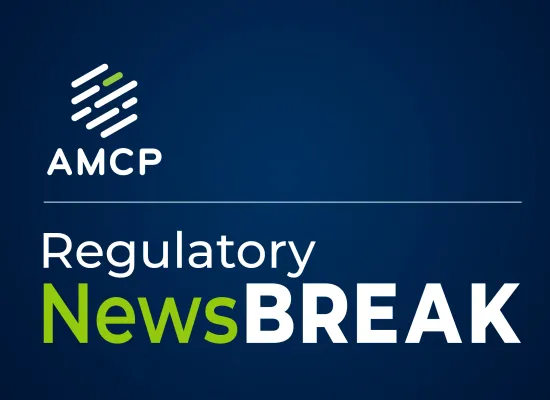CMS Issued Final Guidance for Second Cycle of Medicare Drug Price Negotiation Program
On October 2, 2024, the Centers for Medicare & Medicaid Services (CMS) and the Department of Health and Human Services (HHS) issued the Final Guidance for the Second Cycle of the Historic Medicare Drug Price Negotiation Program for Fiscal Year 2027. The final guidance included the following changes:
Identification of Selected Drugs for Initial Price Applicability Year 2027
- CMS clarified the sources for identifying active moiety/active ingredient when identifying potential qualifying single source drugs across different strengths and dosage forms.
- CMS will exclude prescription drug event (PDE) data with a compound code for compounded drugs when calculating the low-spend Medicare drug exclusion and the rankings of negotiation-eligible drugs.
Requirements for Manufacturers of Selected Drugs
- Maximum Fair Price (MFP) refunds will not be required for PDE records billed as compounds.
- The Standard Default Refund Amount (SDRA) will be calculated by the Medicare Transaction Facilitator (MTF) using Wholesale Acquisition Costs (WAC).
- The 14-day prompt MFP payment window requires the Primary Manufacturer to transmit payment that provides access to the MFP within 14 calendar days of MTF verification that the drug was dispensed to an MFP-eligible individual.
- CMS will propose in future rulemaking that Part D plan sponsors include provisions in their pharmacy agreements requiring dispensing entities to enroll in the MTF Data Module (MTF DM).
- Dispensing entities will be asked to self-identify material cashflow concerns.
- The Medicare Transaction Facilitator Payment Module (MTF PM) will facilitate MFP refund payments.
- The MTF PM will not require dispensing entities to affirmatively elect to participate for the MTF PM to pass along MFP refund payments.
- Upon enrollment in the MTF DM, dispensing entities will indicate whether they prefer receiving electronic transfer of funds or a check.
- The MTF DM will provide an Electronic Remittance Advice (ERA) or a remittance for paper checks to dispensing entities for all MFP refund payments that are passed through the MTF PM. Alternatively, a Primary Manufacturer that chooses not to pass payment through the MTF PM must provide the ERA (for electronic payments) or the remittance (for payment made by paper check) to the dispensing entity.
- For payments made outside of the MTF PM, the MTF DM will provide the bank account information and designated destination for ERAs or remittances to the Primary Manufacturer.
Negotiation Process
- The extent to which a selected drug represents a therapeutic advance compared to its therapeutic alternatives will be considered as of the time section 1194(e)(2) data is submitted, in alignment with when unmet medical need will be considered for the purpose of developing the initial offer.
- CMS will exclude PDE data with a compound code for compounded drugs from the calculations for determining the ceiling for the MFP, determining the Net Part D Plan Payment and Beneficiary Liability of a therapeutic alternative, and applying the MFP across dosage forms and strengths.
- CMS will host up to 15 patient-focused roundtable events, organized by condition when applicable, for all selected drugs for initial price applicability year 2027, during which CMS will seek input from patients, patient advocacy organizations, and caregivers. CMS will host one clinically oriented town hall meeting during which CMS will seek input from clinicians and other interested parties, such as researchers, manufacturers, and members of the public. CMS described its approach to negotiation meetings for initial price applicability year 2027. The first negotiation meeting between CMS and a Primary Manufacturer may occur after CMS issues the initial offer and before the deadline for a Primary Manufacturer to respond to CMS’ initial offer and provide a statutory written counteroffer, if applicable. Up to two more negotiation meetings may occur if CMS does not accept the Primary Manufacturer’s statutory written counteroffer.
- CMS and Primary Manufacturers will have additional opportunities to exchange written offers and counteroffers for the MFP within the CMS HPMS during the negotiation process.
Manufacturer Compliance and Oversight
- CMS outlines the type of information it may request, the communications it may send to the Primary Manufacturer, and processes it intends to follow in its compliance and oversight functions under the Negotiation Program.
- The submission deadline for Primary Manufacturers’ plans to effectuate MFP availability is being delayed from June 1, 2025, to September 1, 2025 for selected drugs with a first initial price applicability year of 2026 and from June 1, 2026, to September 1, 2026 for selected drugs with a first initial price applicability year of 2027.
- Primary Manufacturers must include a process for mitigating material cashflow concerns for dispensing entities in their MFP effectuation plans.
- CMS established a centralized intake system for complaints and disputes related to MFP availability and MTF functionality. Complaints and disputes related to MFP availability and MTF functionality must be submitted to CMS no later than 120 calendar days from the date of the subject of the complaint or dispute.
Civil Monetary Penalties
- The Final Guidance expanded examples of substantive violations related to the MTF.
- CMS updated CMP amounts for inflation.
- CMS revised the information that will be provided in a CMP Notification to include the start and end date of CMP accrual and instructions for submitting a CMP payment. CMS also clarified expectations regarding the timing of CMP payment.
Definitions for Purposes of Collecting Manufacturer-Specific Data
- Direct basic pre-clinical research costs include monetary and non-monetary compensation for investigators and staff researching the selected drug.
- Direct post-Investigational New Drug (IND) application costs include monetary and non-monetary compensations for patient recruitment, per-patient costs, and investigators and staff researching the selected drug. “All Other R&D Costs” is revised to include costs associated with generating real-world evidence submitted to FDA to support the safety or effectiveness of a selected drug or to support or satisfy a post-marketing requirement or commitment. Prior Federal financial support includes the manufacturer’s reasonable estimate of the dollar value of in-kind contributions and Cooperative Research and Development Agreements (CRADAs) that do not have a readily ascertainable value.
- Relevant patents and patent applications do not include patent applications that were denied by the USPTO. CMS also provided additional examples of the types of patents and patent applications CMS considers to be related to the selected drug to provide additional clarity for Primary Manufacturers regarding patent submission requirements.
For questions, please reach out to Vicky Jucelin.
Featured News & Resources
See Full Calendar
Other Events
Award Applications Open
Webinars
AMCP eLearning Day: Nexus Encore
National Meetings
AMCP 2026 Registration Opens
Upcoming Events
AMCP offers a wide variety of educational opportunities, from events and webinars to online training.







